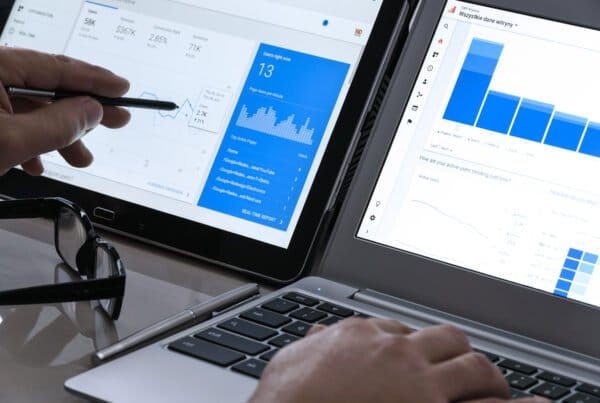Podcasting has a growing audience but is still a relatively unsaturated part of the marketing landscape. It requires less setup than video and can be more engaging than a blog post. This post will look at whether you could benefit from a podcast in your marketing strategy.
What is Podcasting?

Podcasts are digital broadcasts that are hosted and published online. Anyone—from an individual with a hobby to a professional with a large following—can create a podcast. The audio files are typically saved to the computer as WAV or MP3 files before being uploaded to the podcast host of choice.
Listeners can play podcasts at any time through the selected platforms (like iTunes or Spotify) as well as any site where the podcast player is published. Many professional podcasters will include their podcast players on blog posts highlighting the show episode.
Listeners can download episodes and subscribe to their favorite podcasts for updates on new episodes. Most episodes typically range from 20-60 minutes. Podcasts are audio-only shows, but some podcasters will record themselves on video for a video-podcast version to post to YouTube.
While only 22% of American adults were aware of podcasts in 2006, the popularity has gradually increased at a steady rate. In 2021, Statista reports 78% are now familiar with podcasts, and 57% say they have listened to a podcast.
Forecasters project 160 million people will listen to podcasts in 2023.
Who Benefits from Podcasts?

Nearly every kind of business can benefit from a podcast. The podcast can share information with listeners, build a more authoritative presence and connect with your buyers. Plus, podcasts allow you to talk through information, making certain topics easier to understand.
Podcasts may center on industry topics, how-to/DIYSs, politics, expert interviews, tips/tricks, entertainment, storytelling, news updates, spreading awareness and more.
Popular Podcasts in America
All kinds of people create podcasts, and they cover a wide variety of topics. Some of the most popular podcasts today include:
- Stuff You Should Know
- The Joe Rogan Experience
- Crime Junkie
- This American Life
- Radio Lab
- Serial
- Pod Save America
- Office Ladies
- Planet Money
- Fresh Air
What Makes a Podcast Succeed?
The most important thing with podcasting is to know who you are targeting and have a focus for your podcast episodes. However, don’t box yourself in and running out of topics with too niche a selction.
Consistency: Posting regular episodes is an important part of building trust and piquing interest with your followers.
Quality: Using a podcasting mic, posting show notes and clipping out interruptions or mistakes are examples of simple things that may boost quality.
Focus: Use an outline to stay on target and always have a valuable episode planned. You want to be respectful of people’s time. This also means your podcast episode lengths should be limited.
CTA: Like any piece of content, a CTA (call to action) gives your audience something to do next and increases the likelihood of conversion. Your CTA could be to download and rate your podcast, sign up for an email list, try a new product, etc.
Is Podcasting Right for You?
If you have a strong grasp of your target audience and a topic that would interest a crowd, then podcasting may be the right marketing tool to work into your strategy this year.
There are so many ways to use a podcast that it may be more helpful to list why podcasting might NOT be right for you. Here are the main reasons you may not want to run a podcast:
- Lack of resources available to dedicate to your show (time, equipment, money).
- Disinterest in learning new teach or putting yourself out there in show form.
- An audience with no interest in podcasts (like older adults or the tech-adverse).
- A drive for perfectionism (podcasts can be a little off-the-cuff and messy at times).
How Do You Get Started with Podcasting?

If you think podcasting is a tool that could work for you, you may want to work it into your marketing strategy. Here are the basic steps to start podcasting for your business.
Build a Brand
You need a strong sense of who you are and who you are marketing to before you start a podcast. Your podcast will need a name, icon/logo and show style. Most companies already have their brands defined, so you can use that to build your podcast accordingly.
Create a Content Calendar
You may already have a content calendar in place. Schedule your topics ahead of time to research topics, schedule posts, and prepare to promote in a relevant way. Ideally, you will record podcast episodes several days or weeks before you plan to publish them.
Record and Edit Episodes
Capturing your conversations in a professional setting should include a quiet location with a good mic. While headphone mics can help reduce the fade-in and -out of movement (compared to standing mics), they can also catch unwanted sounds, like heavy breathing, coughs, etc. Test out your space because you may find seemingly small things (like the fluorescent light or heater) make a noticeable noise in the background of your recordings. Some podcasters will start in closets or make-shift boxes to help dampen the sound and block out surrounding noises.
Use editing software to reduce any large gaps, distracting interruptions or major issues in the episode. However, it’s best to think big picture and not try to eliminate every single mistake.
Publish Your Episodes
Episodes can be published through a host, like AnchorFM or Buzzsprout. Look into the limitations and costs before committing to a platform. Many will then upload your podcast to directories for the major players and provide you with a player link you can add to your website or blog. Publish episodes along with important information, links, and visual aids that will add value for your listeners.
Promote Your Podcast
Spend time promoting your podcast to improve its reach. Track your engagement and create an email list segment that caters to your loyal podcast listeners.
If you want help building or promoting your podcast, talk to us today! Request your free quote now.











